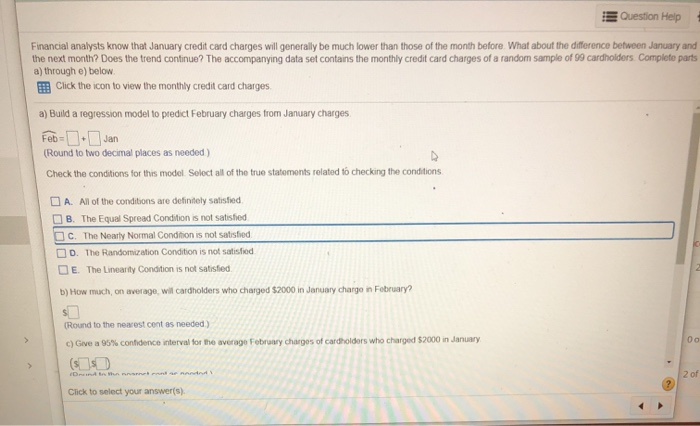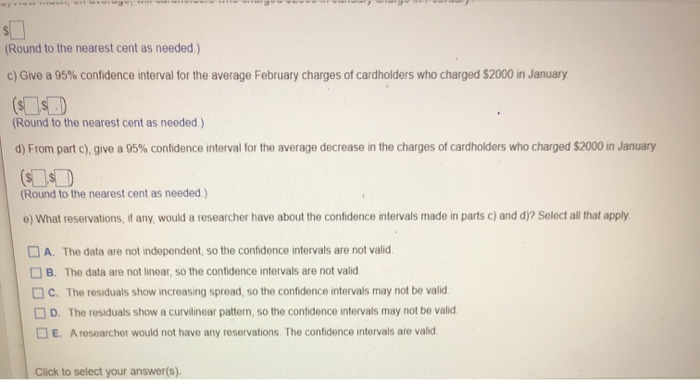all questions must be answered

Question Help Financial analysts know that January credit card charges will generally be much lower than those of the month before. What about the difference between January and the next month? Does the trend continue? The accompanying data set contains the monthly credit card charges of a random sample of 99 cardholders Complete parts a) through e) below Click the icon to view the monthly credit card charges a) Build a regression model to predict February charges from January charges Feb - 1.Jan (Round to two decimal places as needed) Check the conditions for this model Select all of the true statements related to checking the conditions A All of the conditions are definitely satisfied B. The Equal Spread Condition is not satisfied C. The Nearly Normal Condition is not satisfied D. The Randomization Condition is not satisfied DE The Linearity Condition is not satisfied b) How much, on average, wil cardholders who charged $2000 in January charge in in February (Round to the nearest cont as needed) c) Give a 99% confidence interval for the average February charges of cardholders who charged $2000 in January 00 Denn 2 of Click to select your answer(s). (Round to the nearest cent as needed) c) Give a 95% confidence interval for the average February charges of cardholders who charged $2000 in January (Round to the nearest cent as needed) d) From part c) give a 95% confidence interval for the average decrease in the charges of cardholders who charged $2000 in January (Round to the nearest cent as needed.) e) What reservations, if any, would a researcher have about the confidence intervals made in parts c) and d)? Select all that apply. A. The data are not independent, so the confidence intervals are not valid B. The data are not linear, so the confidence intervals are not valid C. The residuals show increasing spread, so the confidence intervals may not be valid. D. The residuals show a curvilinear pattern, so the confidence intervals may not be valid E. A researcher would not have any reservations. The confidence intervals are valid Click to select your answer(s). Question Help Financial analysts know that January credit card charges will generally be much lower than those of the month before. What about the difference between January and the next month? Does the trend continue? The accompanying data set contains the monthly credit card charges of a random sample of 99 cardholders Complete parts a) through e) below Click the icon to view the monthly credit card charges a) Build a regression model to predict February charges from January charges Feb - 1.Jan (Round to two decimal places as needed) Check the conditions for this model Select all of the true statements related to checking the conditions A All of the conditions are definitely satisfied B. The Equal Spread Condition is not satisfied C. The Nearly Normal Condition is not satisfied D. The Randomization Condition is not satisfied DE The Linearity Condition is not satisfied b) How much, on average, wil cardholders who charged $2000 in January charge in in February (Round to the nearest cont as needed) c) Give a 99% confidence interval for the average February charges of cardholders who charged $2000 in January 00 Denn 2 of Click to select your answer(s). (Round to the nearest cent as needed) c) Give a 95% confidence interval for the average February charges of cardholders who charged $2000 in January (Round to the nearest cent as needed) d) From part c) give a 95% confidence interval for the average decrease in the charges of cardholders who charged $2000 in January (Round to the nearest cent as needed.) e) What reservations, if any, would a researcher have about the confidence intervals made in parts c) and d)? Select all that apply. A. The data are not independent, so the confidence intervals are not valid B. The data are not linear, so the confidence intervals are not valid C. The residuals show increasing spread, so the confidence intervals may not be valid. D. The residuals show a curvilinear pattern, so the confidence intervals may not be valid E. A researcher would not have any reservations. The confidence intervals are valid Click to select your answer(s)









